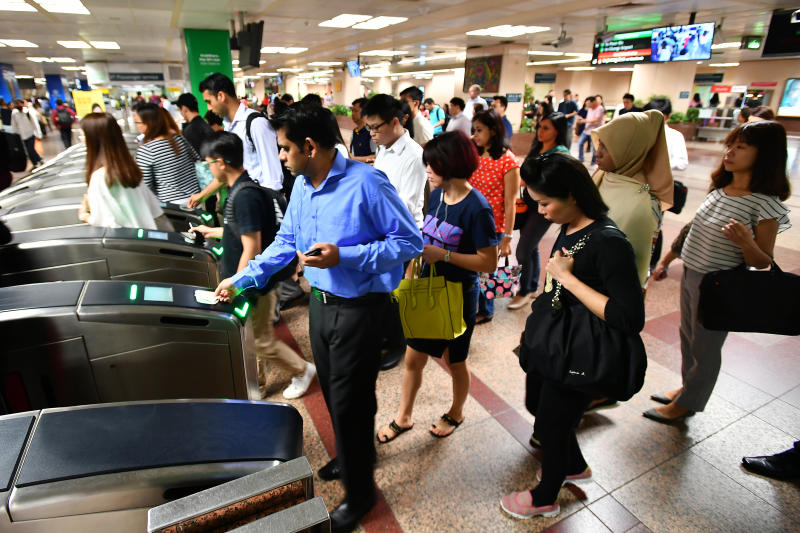Bus and train fares set to rise by not more than 10 cents per journey in latest fare review exercise
Sign up now: Get ST's newsletters delivered to your inbox

The Public Transport Council said the 2018 review will include the network capacity factor, which tracks how much bus and rail capacity has changed in relation to actual usage.
PHOTO: ST FILE
Follow topic:
SINGAPORE - Bus and train fares next year are set to rise by as much as 4.3 per cent, or 10 cents per journey, going by a new component in the public transport fare review formula.
The Public Transport Council (PTC) said in a statement on Monday (Sept 3) that the 2018 review will include a network capacity factor (NCF), which tracks how much bus and rail capacity has changed in relation to actual usage.
Of the possible increase, 3 percentage points can be attributed to the NCF, indicating that ridership growth has not kept pace with the growth in network capacity.
Much of this came from a move to grow the bus fleet, which resulted in a 2.1 per cent rise in distance covered to 33.6 billion place-km last year. At the same time, ridership fell by 1.8 per cent to 5.5 billion passenger-km.
Together with increases in the wage index, energy index and core consumer price index, the formula would give rise to a fare increase of as high as 7.5 per cent.
But because of a 3.2 per cent fare cut which was carried over from last year, the cap would be 4.3 per cent.
PTC member Vincent Chua, an associate professor at the Singapore University of Social Sciences (SUSS), said the 4.3 per cent increase provided for in the formula, if granted in full, "should not result in fares increasing by more than 10 cents per journey".
"As a fellow beneficiary and regular user of our public transport system, I believe it is fair that commuters share the costs of running an improved system," he added.
The PTC also announced changes to transfer rules which will result in lower fares for commuters who are willing to walk a bit more.
It gave the example of someone travelling on the Downtown Line from Little India to Bendemeer, 11 stops away. If he got off at Rochor, walked about 400 metres over to Jalan Besar station and continued his journey - now reduced to three stops from 11 - he would pay 77 cents instead of $1.16. The 39-cent discount applies only if he completes the transfer within 15 minutes.
Currently, anyone making such a transfer would end up paying $1.54 as there is no transfer subsidy.
The council noted that public transport fares had fallen by 8.3 per cent in the last three years, largely on the back of double-digit falls in energy prices.
National University of Singapore transport researcher Lee Der-Horng said: "The public does not need to be concerned with NCF because if the level of service comes down in terms of congestion levels, it will lead to a downward fare adjustment."
SUSS transport economist Walter Theseira said the new transfer rules "will hopefully increase commuter flexibility to complete their journey in the most convenient way possible without worrying about incurring additional costs".
But he said capping monthly fare expenditure to the cost of a monthly fare pass might be the next step. He cited London as one place where such a cap exists.
Commuter Jeff Chew said that while having a comprehensive network is a good thing, "there must be a limit".
Mr Chew, 80, said the fare increase would just add to "the basket of goods and services which have gone up in price".
Commenting on the NCF, which is a tool to make commuters share the burden of transport improvements, Mr Chew said: "It means higher cost of living, and it might sour the ground somewhat," he said.
The retiree added that the new transfer ruling would be a bigger boon if Singapore had comprehensive underground linkways such as those in Hong Kong.
Singapore had moved slowly on this score, he said, adding: "And our weather is harsher year round."

